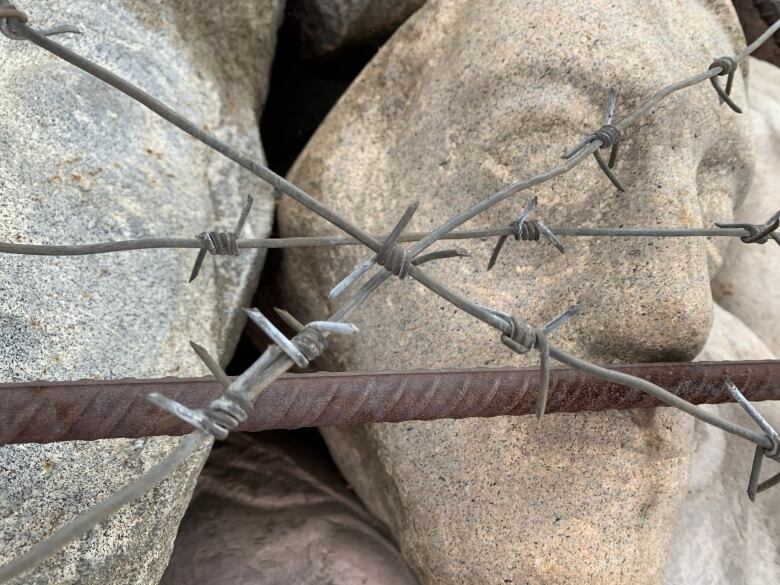Why a Moscow kebab shop has reignited debate over Stalin's legacy
Muscovites, authorities angry that totalitarian leader's name is being used to promote take-out food

Mariana Turkenich had heard about a new kebab shop named after Soviet dictator Joseph Stalin, but she says actually seeing his face hanging over the sidewalk in her Moscow neighbourhood made her nauseous.
"I feel it's just as if you were in Berlin and had a 'Hitler doner' or a 'Göring kebab' or maybe a 'Dr. Mengele pita,' " said Turkenich, 43, as she took a photo to share on social media.
"I want to cry. I'm very upset."
She said the matter-of-fact way that the image of a man responsible for the deaths of millions of Russians in the last century is being used to sell fast food is a terrible sign that modern-day Russia is forgetting the oppression of its Communist past.
The chief cook and creator of Stalin Doner views it differently.
Stanislav Voltman, 27, opened his storefront in the middle of the Russian new year holiday last week and celebrated a vigorous first day serving more than 200 customers.
"It was a stunning success," he told CBC News in an interview.
Customers appeared to be especially drawn to his "double Stalin burger," followed closely by a kebab named after Stalin's henchman, Lavrentiy Beria.
All of the food was served up by Voltman and other workers dressed in uniforms of the NKVD, Stalin's secret police who would later become the KGB.
"Hitler for me is obvious evil," said Voltman, explaining why a store using Hitler's image to sell food would be different from one emblazoned with Stalin.
He suggested Stalin wasn't the only Russian leader who employed violence to stay in power.
"Under Boris Yeltsin, [people] died, too, and disappeared — and during the reign of Ivan the Terrible and Peter the Great — all of this happened in history."
Stalin's "ambiguous" nature makes him an interesting figure to build a business around, Voltman said. "You can't just definitively say he's all good or all bad."

Putin tries to reconcile 2 sides of Soviet past
Stalin was a dictator who sent millions of Russians to their deaths in remote prison camps and had countless others executed over three decades. Under his totalitarian leadership, between 1929 and 1953, as many as 10 million Soviet citizens, including Russians, Ukrainians and ethnic minorities, were killed via executions, forced labour or famine, making him one of history's worst tyrants. Opponents were eliminated, dissent was suppressed and history books were rewritten to his liking.
But he was also the Soviet leader whose armies defeated Nazi Germany in the Second World War and later transformed Russia into a superpower.
Over the 20 years of President Vladimir Putin's rule, the Kremlin has struggled to reconcile both realities.
On the one hand, Putin himself opened a Wall of Grief in a prominent location off a busy Moscow boulevard intended to commemorate Stalin's victims.
Yet on the other hand, Putin's government has been attempting to rewrite the history books to portray Stalin as a victim of deceitful Western leaders at the start of the Second World War, effectively trying to absolve him for any blame in signing a pact with Nazi Germany.

"For Russian youngsters, Stalin is a figure from the distant past. His appearance ... doesn't shock anyone," scholar Andrei Kolesnikov wrote in a 2019 article for Moscow's Carnegie Center where he attempted to explain how Stalin's complicated past plays into current Kremlin politics.
"Even Putin's closest allies readily admit that Stalin was a cruel tyrant. But thanks to the Kremlin's well-crafted propaganda efforts, the dictator is once again becoming a symbol of Russian pride and military and industrial glory."
Hours of questioning by police
The Levada Center, the only independent polling agency in Russia, has noted Stalin's image has consistently improved during Putin's long rule, with roughly 70 per cent of Russians surveyed now saying he played a positive role in the country's history.

Still, it appears Moscow authorities would prefer Voltman's food stand would simply go away.
The day after the opening, police showed up and told him he needed to change the name or close down for good.
After Voltman refused to do either, he said they unplugged his refrigerator, spoiling his food, and took him in for hours of questioning and "humiliation."
"I would have pangs of conscience if I had put up slogans about the gulag and the deaths of people … but I'm not hurting anyone with this."
Voltman posted a video on his Instagram account of a man taping a red hand print — symbolizing blood — to his window, with the words "Stalin and Beria were executioners."
Someone else had walked by and spit on the front window, where it had then frozen.
"My family was repressed," said Geliya Tagirova, 82, who stopped to talk to CBC News. "For people who lived through repressions and are still alive, this is painful. It's disrespectful to them."

"In our country, unfortunately, there are people who are not as negative towards Stalin as I am," said Yevgenny Smoslky. "Morally speaking, I do not think this is right."
While Voltman's kebab shop is closed for the moment, he said he hopes it won't be for long. He said his three workers quit after the opening day fearing more harassment from police, but he's expecting to hire more people and reopen soon.
"If you don't like it, you can keep walking by," he said. "If you think it's OK, come in and buy something. No one is forcing you to do anything."


